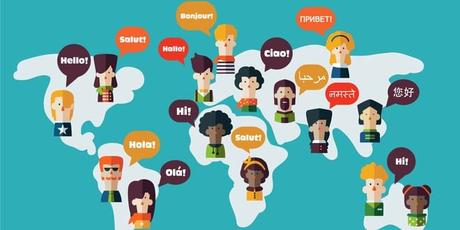If the online business that you are working on is doing great in your nation, you should seriously get some expand over universal markets. To get success in new markets requires some additional interests in SEO, however. You would be wise to begin considering multilingual SEO if you want to be sure your site will be found and utilized well in different nations! Here, I'll clarify what multilingual SEO is, the reason it's significant, and which components it comprises of.
So, if you're expanding in other regions, and need a professional translation service like The Word Point. It's a professional website, and there are staff managers who will help you with your needs.
What is a Multilingual SEO?

Multilingual SEO manages by offering optimized content for different dialects or various areas. How about we clarify this with a model.
Envision you have an online shop: you sell WordPress modules in numerous nations.
To expand your deals in Germany, you've chosen to make an interpretation of your substance into German and make a German site. Presently, you have two varieties of a similar page: an English and German adaptation. Truly straightforward, you'd state? There's more.
Particularly if you need to target nations with comparative dialects or countries where numerous dialects are used, this will represent a few difficulties.
For example, you need individuals who search in German to be coordinated to the German site. Possibly you even need to have a particular place for German speakers in Switzerland. It would be surprisingly better to have a French option for speakers of French in Switzerland also.
How about we accept that for the time being that you don't have the necessary assets for that, however. It's presumably best to send clients from Switzerland who communicate in French to the English site. Also, you have to ensure that you send every other client to your English site, as they are bound to communicate in English than German. In a situation like this, you have to set up and actualize a multilingual SEO system.
How it Multilingual SEO Works
1. Try to figure out which language you want to use
So, plan on which regions you want your website to be. To see your website analytics, and check what the top country is. And see what languages they speak.
2. Figure out which content you want to translate
Don't focus on bringing all of the material; some maybe isn't relevant now and will not benefit you. So, try to find what are your best hits and your best content, try to translate them first. So, you can get more traffic. You can also try to look for pages that have high volume keywords.
3. Get a separate top-level domain
Try to get more areas for each language you are planning to use.
example.fr (French)
example.co.uk (British)
example.es (Spanish)
4. Avoid Auto Translate
Don't use services like translators or something; they are often not accurate. And can result in poor quality which the viewers will acknowledge and they will never return to your website.
5. Translate with a Native Speaker
You should always consider hiring native speakers to translate your content. It's better to hire someone who is a native speaker and who knows basic English.
6. Boost Your Multilingual Sites
Start building up some links on your multilingual site. Try to reach out to the audience in the language your content is written on. And see if they show interest.
7. Track Results
Always check your results on your multilingual site, and you can see either you are doing good or you're just on the wrong path.
For what reason is multilingual SEO a thing?
You need your site to be found with Google. In a standard SEO procedure, you upgrade your substance for one language: the language your site is written in. Once in a while, in any case, you need to target spectators in various nations. '
These spectators are most likely comparable. However, there are consistently different. This presents you with a chance. By focusing on your spectators explicitly, it is simpler to address their needs. One of these distinctions is the language they talk about. When you make your site accessible in a few dialects and target specific locales, you accomplish two things:
You expend potential audience
You improve your odds of positioning for a particular district and in a few dialects.
Let's revisit some things
How about we return to the model we examined before in light of this. By making a German variety of your unique English site, you've made it feasible for clients looking in German to discover your item. At last, multilingual SEO is tied in with tending to the requirements of your clients.
Everything sounds rather apparent; however, multilingual SEO can be hard. A great deal can turn out badly, and a terrible multilingual execution can hurt your rankings. This implies you have to realize what you're doing. That's why you need to play it safe and visit us at The Word Point, where we will help you, and you won't have any problems to worry about.
Perhaps the greatest danger of multilingual SEO is copy content. If you present fundamentally the same as a substance on your site on various pages, Google won't realize which material to appear in the web search tools.
Copy pages contend with one another, so the individual rankings of the pages will go down. You can stay away from this specific issue with hreflang, a component of your multilingual SEO technique. In any case, there's a whole other world to multilingual SEO. How about we examine the principle viewpoints beneath.
Content for worldwide locales
The content is a significant part of your multilingual SEO technique. If you need to compose content in various dialects, you'll have to adjust existing content or make new content. Changing while keeping up great SEO can be a test.
Your content system ought to consistently begin with watchword examine for the area and language you're focusing on. You can't merely interpret your slogans utilizing Google Translate. You'll need to get inside the leaders of your new crowd. You have to realize which words they are using. The same words can have various implications in dialects utilized in numerous nations.
So, to translate the content can be a tough challenge, to begin with. And the copy won't be good for your new audience. Something else, your duplicate won't offer your new group of spectators. If that is conceivable, you should have local speakers interpret or possibly check your understood content to avoid you from committing unbalanced errors.
Space structure for global locales
To effectively focus on your audience, you have to think about which pages you need them to arrive on. There are a few choices as to what domain you're going to be using. Do you have to get the ccTLD (nation code Top Level Domain) like example.de for Germany? How do you even set up a domain for those countries? There are a lot of things to consider, so that's why it is a lot harder.
Hreflang
Hreflang is the specialized execution you'll have to set up in case you're offering your content in numerous dialects. You need to tell Google which results to whom to show in the search. So it's not that easy.
Global desire? Get your multilingual SEO, right!
Multilingual SEO centers around optimizing content for various dialects for web search tools. Multilingual SEO can be hard, however, and you have to realize what you're doing.
Heidi Godin studied at UCLA, now trying to improve herself in writing career. She is always seeking to discover new ways for personal and Professional growth"

